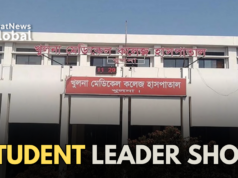India and the United States are facing “challenging” times as far as clinching a bilateral trade deal is concerned, says Mark Linscott, Senior Trade Policy Adviser, US-India Strategic Partnership Forum.
This is even as New Delhi has been “caught in the middle” for buying Russian oil and Washington is keen on ending the war between Russia and Ukraine.
Speaking exclusively to StratNews Global, Linscott, said both India and the U.S. were discussing an “ambitious” trade agreement which has the potential to benefit both countries before President Trump got upset with India buying crude from Russia and called it a “dead economy”.
Linscott stressed that the Trump administration is still keen on doing the deal with India and will continue the negotiations.
“He (President Donald Trump) has been leveraging his desire to strike a deal with Russia on Ukraine and India being caught in the middle of that… His comments directed at India were surprising, unfortunate, highly provocative and very aggressive,” Linscott, who served as Assistant U.S. Trade Representative under the first Trump administration.
Within just six months coming to power, President Trump has made it his first priority to end the war between Russia and Ukraine. He recently met Russia’s President Vladimir Putin in Alaska followed a meeting with Ukraine President Volodymyr Zelenskyy along with all European leaders and NATO, at the White House on Monday.
Linscott, who represented the US at the World Trade Organisation, also said that the two countries were negotiating “much bigger set of issues” under the BTA, which included market access, tariffs and non-tariff barriers across the board, trade in services, intellectual property rights and public procurement, among others.
“There was at least a picture on what could be accomplished as part of an interim agreement associated with reciprocal tariffs, that then was for the President to consider, the President is the trade negotiator-in-chief of this administration,” he said, adding that the sensitive subject of market access in agriculture was “not part” of the the talks.
“They (market access in agriculture) are issues for down the road … The ambition is for a much larger bilateral trade agreement which might take years,” Linscott pointed out hinting at the fact that lowering of tariffs in agricultural items are never part of the interim deal, the talks for which have got stalled for now.
Misunderstandings
On the issue of whether or not President Trump expected New Delhi to acknowledge the role he played during the India-Pakistan conflict, referred to as ‘Operation Sindoor’, Linscott said, “There is clearly a misunderstanding between both sides and at the leader level.”
“Ideally there would have been a phone-call or some kind of a direct engagement on the trade matters to hammer out a deal on reciprocal tariffs,” Linscott highlighted.
But he did stress on the fact that India’s purchase of Russian oil is now “part of the equation” that is getting reflected on trade matters.
“Trade issues are still very important to this administration… Despite the current setback both sides need to keep the eye on the ball. Ideally we can have the leaders have a call, clear the air and the negotiations can continue,” said Linscott.




